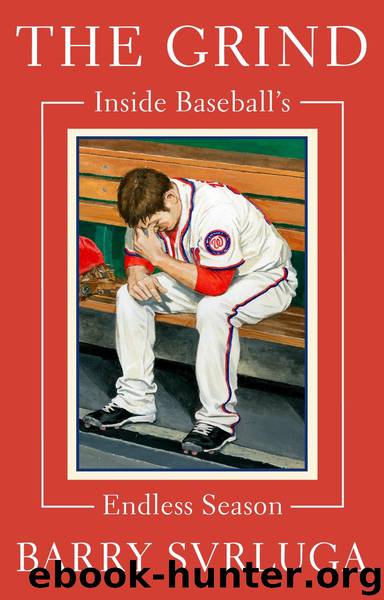The Grind by Barry Svrluga

Author:Barry Svrluga
Language: eng
Format: epub
Publisher: Penguin Publishing Group
Published: 2015-06-03T04:00:00+00:00
• • •
When the Nationals players gathered for the final game of their penultimate home stand of the year—a 4:05 p.m. start against Atlanta—they walked through the concrete concourse, added their roller bags to Wallace’s pile of luggage, then entered the clubhouse. On the whiteboard just outside the main locker room, one of many places that day’s lineup is posted, McDonald had neatly printed the decorum, unchanged from the beginning of the year, always worth a reminder:
Train Trip—Jeans & Dress Shirt
Plane Trips—Slacks, Dress shirts, Dress shoes
On the floor in front of each locker sat a blue bag with the club’s curly W logo on the end, unmistakably Nationals gear. Into each would go baseball gloves, spikes, flip-flops, socks, sunglasses, shorts, braces, cups, ointments, lotions—the stuff the players need at the ballpark. Getaway day, as such travel days are known in the majors, is scarcely a getaway for Wallace and his staff of four full-timers and eight seasonal workers, many of whom double as batboys.
“Controlled chaos,” Wallace said.
He is fifty-five and has been in major league clubhouses for nearly four decades, ever since his mother took over laundry duties when the Washington Senators moved to his hometown of Arlington and became the Texas Rangers. Back then, at fourteen, he made $4 a day for putting out laundry, shining shoes, running errands, whatever players needed whenever they needed it. The postgame spreads consisted of chips and dip, the clubhouse had one tap for soda and another for beer, players used one pair of shoes for batting practice and another for the game, and that was it. Wallace took Gaylord Perry’s Lincoln Continental to his junior prom, got Izod shirts and Italian leather zip-up boots from Jim Fregosi, babysat for Buddy Bell and Sandy Alomar—players whose sons became major leaguers. Those sons have now retired, too.
Wallace was with Bo Jackson in Kansas City, won a World Series with the Florida Marlins in 1997, endured the nomadic life of the Montreal Expos in the early part of this century—when some “home” games were in Puerto Rico—and helped the Nationals transition first to RFK Stadium, where he slept during the summer of 2005, then to Nationals Park.
And for all the differences, nothing has changed.
“It can have a tendency to become Groundhog Day–ish,” he said. “But every day, you don’t know how the game’s going to end. It’s not like any other nine-to-fiver.”
Off to the side of the clubhouse, three chefs worked on the Nationals’ pregame meal. Healthy options—a chicken and a fish, sandwiches, cereal, salad—are offered every day. In 2010, when right fielder Jayson Werth was with the Philadelphia Phillies and approaching an offseason in which he would be a free agent, he stopped during batting practice one day and asked Adam Dunn, then the Nationals’ first baseman, how he was treated in Washington. Forget the money for a second. How is the organization?
“Sometimes, guys’ll say, ‘Ehhhhh,’” Werth said. “You don’t want to hear that. But he surprised me. He said he was treated great. He said he had everything he needed, that the people were great.
Download
This site does not store any files on its server. We only index and link to content provided by other sites. Please contact the content providers to delete copyright contents if any and email us, we'll remove relevant links or contents immediately.
Machine Learning at Scale with H2O by Gregory Keys | David Whiting(4312)
Never by Ken Follett(3954)
Liar's Poker by Michael Lewis(3447)
The Ultimate Backcountry Survival Manual by Aram Von Benedikt; Editors of Outdoor Life;(3266)
Will by Will Smith(2919)
The Partner by John Grisham(2396)
Can't Hurt Me: Master Your Mind and Defy the Odds - Clean Edition by David Goggins(2339)
Friends, Lovers, and the Big Terrible Thing by Matthew Perry(2230)
Taste by Kris Bryant(1862)
A Short History of War by Jeremy Black(1848)
HBR's 10 Must Reads 2022 by Harvard Business Review(1841)
A Game of Thrones (The Illustrated Edition) by George R. R. Martin(1744)
Never Finished: Unshackle Your Mind and Win the War Within by David Goggins(1712)
515945210 by Unknown(1665)
Why We Love Baseball by Joe Posnanski(1658)
The Arm by Jeff Passan(1613)
443319537 by Unknown(1553)
The Dodgers by Schiavone Michael;(1532)
The Yogi Book by Yogi Berra(1525)
